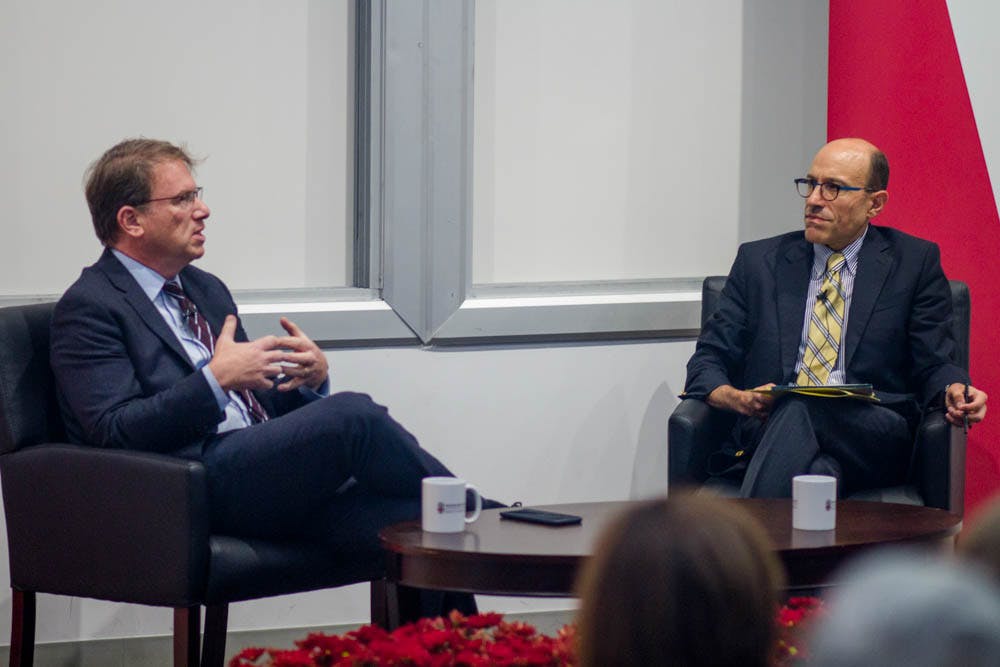Jeffrey Goldberg, editor-in-chief of the Atlantic, spoke at the University Tuesday to a packed audience as part of a conversation with the Director of the Watson Institute for International and Public Affairs Edward Steinfeld titled “Donald Trump, the Free Press and the Future of American Democracy.” In a wide-ranging talk, Goldberg discussed topics such as the “symbiotic relationship” between President Donald Trump and the press, the failure to take Trump’s candidacy seriously and the implicit racism of Trump supporters.
Goldberg, who has served as editor-in-chief for eleven months and as a journalist for several decades, explained that despite Trump’s repeated attacks on several organizations in the free press, outlets have largely seen an increase in readership and subscription rates during the same time period, including his own publication. Though this symbiotic relationship exists, Goldberg said some in the press have taken it upon themselves to join the “resistance,” fighting back against Trump. He has advised his staff to do otherwise: “It was very important to me that (the Atlantic) not join ‘the resistance’. You don’t have to join the resistance, just do your job. Double down on driving a fact-based discourse,” Goldberg said. “The point of journalism is not to bring down the president. The point of journalism is to tell the truth.”
Goldberg also discussed the failure of the media to handle Trump’s candidacy appropriately. As he pointed out, previous presidential candidates across the political spectrum have not manipulated basic facts in the way that Trump has, forcing the media to re-evaluate their coverage of him. “We were not equipped for a person to do the things that he did and then become more popular,” Goldberg said.
Goldberg spoke at length about the implicit racism of Trump supporters. Some people, most notably Ta-Nehisi Coates, a national correspondent for the Atlantic and friend of Goldberg, have been largely negative about Trump’s election, saying that anyone who voted for him implicitly supported racism, even if they are not outwardly racist. Goldberg largely agreed with this outlook, saying, “if you (voted) for Donald Trump, it doesn’t necessarily make you a racist. … To have voted for Donald Trump means that you made a conscious decision (to agree with Trump’s racism) or made a conscious decision not to look at all the things that he had said over the years.”
In his talk, Goldberg used the term “homeless conservatives,” which he described as “the ones who remain true to their ideals but reject Trump as a false conservative.” During the question-and-answer session following the talk, Ethan Shire ’19 pushed Goldberg to elaborate on that point, asking if he felt that Trump would take “homeless conservative” journalists under his belt. Goldberg’s answer was a resounding no. “President Obama did much more outreach to the leaders of intellectual conservatism than Donald Trump does. Donald Trump has set himself up in opposition to that camp,” he said.
Attendees largely enjoyed Goldberg’s event, heavily applauding and laughing at his various jokes, which Steinfeld labelled “acid humor.”
Maya Fitzpatrick ’20 said the event was “incredible,” adding that “it was interesting to hear from someone who is more moderate, someone who’s saying that the world’s not ending, especially from someone who’s in a really powerful position right now.”
Jonah Shrock ’20 said that he really enjoyed Goldberg’s discussion on the “symbiotic relationship” between the press and Trump. “It’s an issue I’ve been thinking a lot about and he made a lot of intelligent points,” Shrock said.





